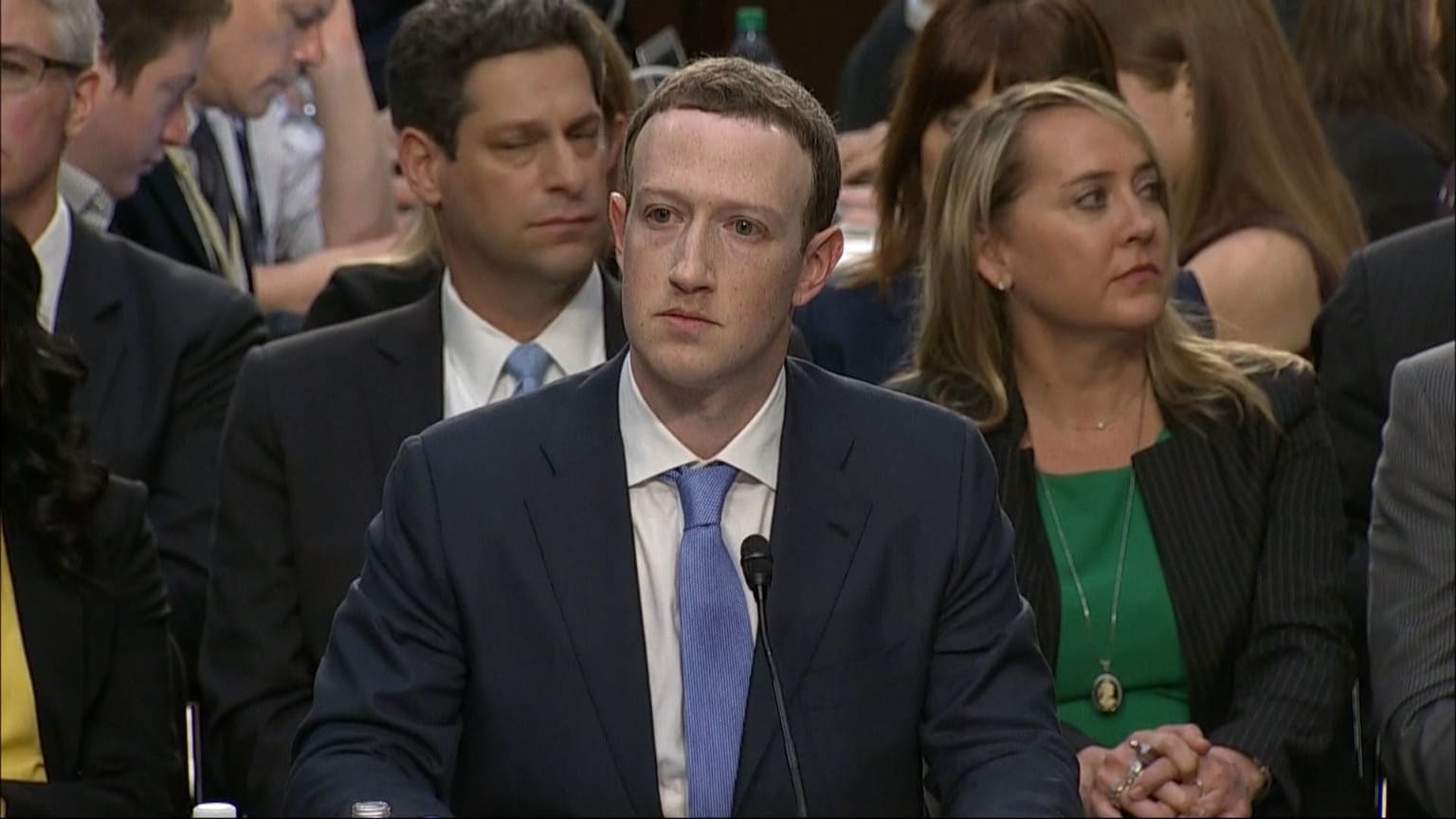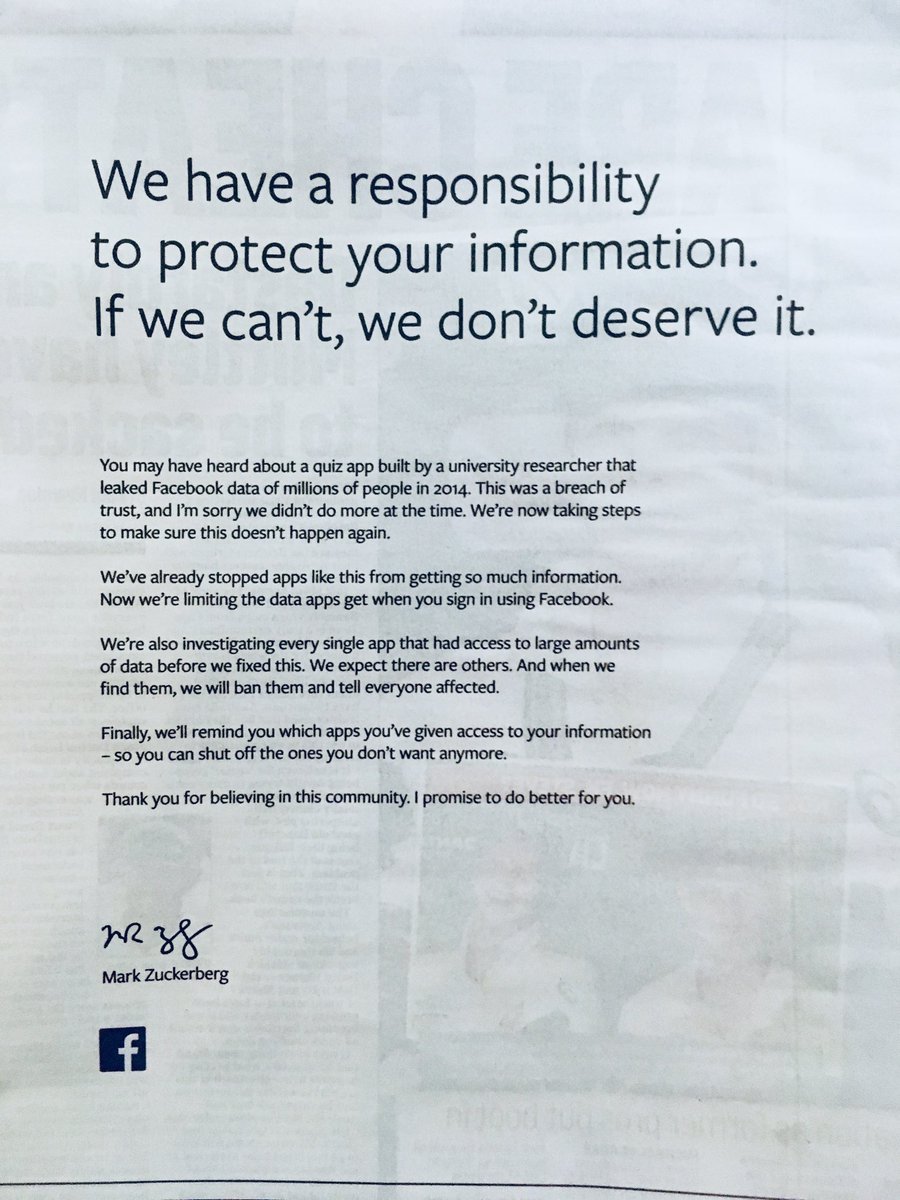Facebook is once again under fire for a massive data security scandal after Christopher Wylie, former director of research at Cambridge Analytica, revealed how a quiz app was used to gather information about 87 million Facebook users, which eventually landed in the hands of Cambridge Analytica. This data was then used to gain advantage in the 2016 elections, by delivering pro-Trump content to Facebook users.
Indeed, recent events have been extraordinary for the social media company. They’ve even warranted a testimony from the CEO himself, Mark Zuckerberg, before 44 members of the United States Senate Commerce and Judiciary committees last Tuesday, April 10, 2018.
The Cambridge Analytica Scandal: How We Got Here Today |
April 21, 2010Facebook launches Open Graph API, a platform that allowed external app developers to reach out to Facebook users and request permission to access their personal data as well as their Facebook friends’ personal data. This includes the user’s name, gender, location, birthday, educational background, political preferences, relationship status, religious views, online chat status and more. |
2013Cambridge Professor Aleksandr Kogan, along with his company, Global Science Research launched a quiz app called “thisisyourdigitallife” that prompted users to answer questions for a psychological profile. 300,000 users took the quiz, and the app harvested their personal data, as well as their Facebook friends’ data. 87 million Facebook users’ personal information were collected through the app. |
2014Facebook updated its policies to limit the amount of data that is accessible to third-party developers. Kogan and his team were allegedly notified, but they did not delete the data they had on hand. |
December 11, 2015A Guardian report claimed that Cambridge Analytica was working for Ted Cruz’s presidential campaign, and that it reportedly used psychographic data based on research on tens of millions of Facebook users. Upon learning about the data breach, Facebook pressured Aleksandr Kogan and Cambridge Analytica to delete the improperly acquired data. Facebook was informed that the data has been deleted. |
2016During the US presidential elections, Donald Trump’s campaign team claimed to have invested heavily in Facebook ads through the help of Cambridge Analytica. Mark Turnbull, Cambridge Analytica’s managing director, even told Britain’s Channel 4 News that the company was behind the “Defeat Crooked Hillary” video campaign on Facebook. |
March 17, 2018In an exclusive interview for The Guardian and The New York Times, former Cambridge Analytica employee revealed how the data analytics firm amassed millions of Facebook profiles of US voters and how they used the data to predict and influence votes. The report initially indicated that the firm harvested over 50 million Facebook profiles, but it was later corrected to 87 million. |
March 20, 2018The Federal Trade Commission launched an investigation into whether Facebook had violated a settlement reached with the U.S. government agency in 2011 over user privacy protections. |
March 21, 2018Mark Zuckerberg announces that Facebook would reduce the amount of information users need to provide third-party apps and websites and that the company would audit all apps with access to Facebook data before 2014. |
March 25, 2018Facebook published full-page ads in major newspapers in Britain and the US to apologize to Facebook users for the “breach of trust”. |
April 10 and 11, 2018Mark Zuckerberg testifies at the joint hearing of the Senate Judiciary and Commerce committees. |
So, what happened at the senate hearing?

Day 1 – April 10, 2018
Facebook Founder and CEO Mark Zuckerberg was questioned by various members of the US senate about events surrounding the Cambridge Analytica scandal and the company’s policies. A plethora of issues were discussed, ranging from data security and Facebook’s future plans to prevent data breaches, to fake news, hate speech, international interference in political events, and even sex trafficking.
“We didn’t take a broad enough view of our responsibility, and that was a big mistake. And it was my mistake. And I’m sorry. I started Facebook, I run it, and I’m responsible for what happens here.” – Mark Zuckerberg, Opening Statement
In the span of more than five hours, Zuckerberg repeatedly pointed out how Facebook failed to take a broader view of their responsibility around privacy. He assured the senators that Facebook is doing what they can to ensure that the problem is resolved, and that it won’t happen again.
Zuckerberg outlined three strategies to address the current issues.
- Facebook will conduct a full audit to determine the events surrounding the Cambridge Analytica scandal and remove any and all data they may still have.
- Facebook will investigate every single app that had access to Facebook data, and determine whether any app developers have misused the information in some way. The developer/s will then be banned from Facebook.
- Facebook will ensure that developers will not have access to much information about its Facebook users.

Picture 1. On March 25, 2018, Zuckerberg circulated full-page ads in several British and American newspapers to apologize for a “breach of trust.”
But, lawmakers were still concerned about Facebook’s values on trust and transparency, as well as their commitment and capability to prevent their platform from misusing and abusing the data of its 2 billion users across the world.
Access the complete transcript here.
Day 2 – April 11, 2018
For almost five hours, Mark Zuckerberg once again faced US congressmen to answer questions about Facebook’s data privacy and user protection policies. He faced tough questions and at times, may have been cornered into addressing difficult issues, such as illegally operating online pharmacies on Facebook.
“Are you willing to change your business model in the interest of protecting individual privacy?” – Rep. Anna G. Eshoo, D-Calif
The Facebook founder encountered more “yes or no” questions that hindered him from evading issues, yet there are still a lot of critical questions about Facebook’s business model that remain unanswered. However, Zuckerberg ensured the congress that they realize the need to build more AI tools that will enable them to screen, filter, and remove harmful content.
When pressed about the way the platform tracks and collects data about its users, Zuckerberg insisted that it’s all controllable by the user, but that their company is exploring more avenues toward making sure that user data remains secure.
He reiterates that on Facebook, users have full control over their information – the content is shared or posted by the users themselves, and that they can take it down anytime they wish. According to Zuckerberg, this is unlike any surveillance organization where people have no control over what information is being collected about them or how it’s being done.
Access the complete transcript here.
What Does This Mean for Marketers?
The Cambridge Analytica scandal has certainly opened channels of discussion regarding the extent to which businesses, organizations, entities, and Facebook itself should be allowed to use data for various purposes. The current business model of Facebook is that it’s free to use, but they generate profit and revenue from ads that run through their platform.
“What we found is that even though some people don’t like ads, people really don’t like ads that aren’t relevant. And while there is some discomfort for sure with using information in making ads more relevant, the overwhelming feedback that we get from our community is that people would rather have us show relevant content there than not.” – Mark Zuckerberg, Congress Hearing, April 11, 2018
As marketers, we have to admit that we benefit from Facebook advertising the same way Trump’s campaign team did. We create ads targeted to a specific market or audience, and Facebook directs these ads to those consumers.
Facebook is more than just a social media giant. It’s a platform that marketers around the world use to reach their target audience. The data collected through the platform enables Facebook and its advertisers to execute hyper-personalized campaigns so we can all profit and grow our businesses.
Here are some of the major trends you can expect to see over the coming months/years:
1. Consumers will be less willing to share data with third-party entities.
We’ve all done it at some point. We’ve created signup forms that enable users to sign up using their Facebook account, to reduce friction and make it easier for users to opt-in to our newsletters and email lists.
But in light of recent events, users will become hesitant to readily provide their information. It’s now imperative for marketers to further innovate the content they create in exchange for data and customer information. More importantly, brands will need to make it clear to consumers exactly how their data will be used and that they still have full control over who gets access to it. Trust is now more important than ever when it comes to building relationships with your audience.
2. Facebook will increase their data security policies.
Marketers can expect Facebook to increase security measures within the social media platform. So, it may not be as easy for marketers to post, republish, and syndicate content on the platform. It will also be more difficult to create new accounts for promoting products, services, and branded content.
This will inherently change the way marketers use Facebook, which might be a good thing. Audience engagement will now have to be more less organic, meaning that there will be a clear distinction between user-generated and commercial content.
3. Facebook will restrict the amount of user information available to third-party websites and apps.
Facebook may even reduce the fields that users need to fill out – that means less information that marketers can gather and less data to power up personalized marketing strategies. In the senate hearing, it was argued that Facebook collects data even outside the platform.
When ads are placed in front of their target audience, Facebook Pixel enables advertisers to track their effectiveness. When users click through the ads and make a purchase, Facebook knows that it came from their ad, and this information is passed on to the marketers and advertisers concerned. This feature may become restricted in the near future.
4. Congress may create and pass regulations that will affect all online platforms and social networks.
In the future, there may be much more regulation surrounding data analytics and the digital landscape. Mark Zuckerberg claimed during the senate hearing that he is agreeable to the right regulations that will help protect users and ensure the privacy of their data. But, will marketers still be able to collect data through marketing automation software and tailor content/distribute it, targeting the right people?
In tri-media (print, radio, tv), the production of content is centralized to media practitioners. The content producers have more control over what to show audiences. In effect, they have a huge power over what consumers and audiences may deem important.
In digital, on the other hand, the consumers of content have become the producers (prosumers). The internet has become a free space for open ideas and opinions, making content production and publication much harder to regulate. The digital landscape is global, inter-connected, and everyone is producing content.
As such, it’s the consumers and audiences that tell media practitioners, marketers, and advertisers the kind of products, services, or content that they consider to be important.
5. Consumers will demand more honesty and transparency from here on.
People were surprised when the news broke out about the Cambridge Analytica scandal – have we truly been manipulated into making decisions we otherwise wouldn’t?

Picture 2. On April 12, 2018, Viber (and other platforms) sent out notifications that provided information on their data security measures.
As such, marketers will need to clearly show their customers, subscribers, and prospects how they are using the information provided. Marketers need to find a solution that will provide the transparency that’s being demanded while preserving industry secrets and strategies that may be counter-profitable if shared with their audience.
Key Takeaways

The recent Cambridge Analytica scandal involving the data of 87 million Facebook users will surely bring about new trends and challenges for marketers in the coming months. This can be the advent of an era where internet regulations will arise, and marketers will have a hard time leveraging organic traffic, shares, and user engagement.
Most social platforms and content sharing platforms, in fact, regulate content publication themselves, further blurring the lines between the ethical use of data and the misuse and abuse of it.
At the moment, there are just a number of regulations surrounding content production, digital advertising, and online marketing. Most of them, in fact, rely on subjective human perception between what’s ethical and what’s unethical. But, as the lawmakers pointed out in the hearing, the people behind the screening of Facebook content may have their own personal biases.
For now, it’s uncertain whether lawmakers will let Facebook (and other similar platforms) retain control over data privacy and security. But, if they come up with strict regulations, it may leave marketers blind – we may no longer have access to the wealth of data that we’re now benefiting from.
Inbound marketing is about providing the right content for the right people, at the right time, through the right platform. Data analytics definitely opened up the eyes of marketers to more specific and targeted strategies that allow us to reduce costs while increasing revenue from inbound strategies. But, without data analytics, will this still be possible or do we have to go back to casting a wide net, hoping we’ll catch the right fish?
As marketers, we need to proactively seek new strategies and methods that will enable us to push relevant content that’s tailored to our target audiences. We need to find innovative ways to entertain, delight, and educate our markets.
For us here at Spiralytics, it’s a challenge we’re willing to face head-on.





